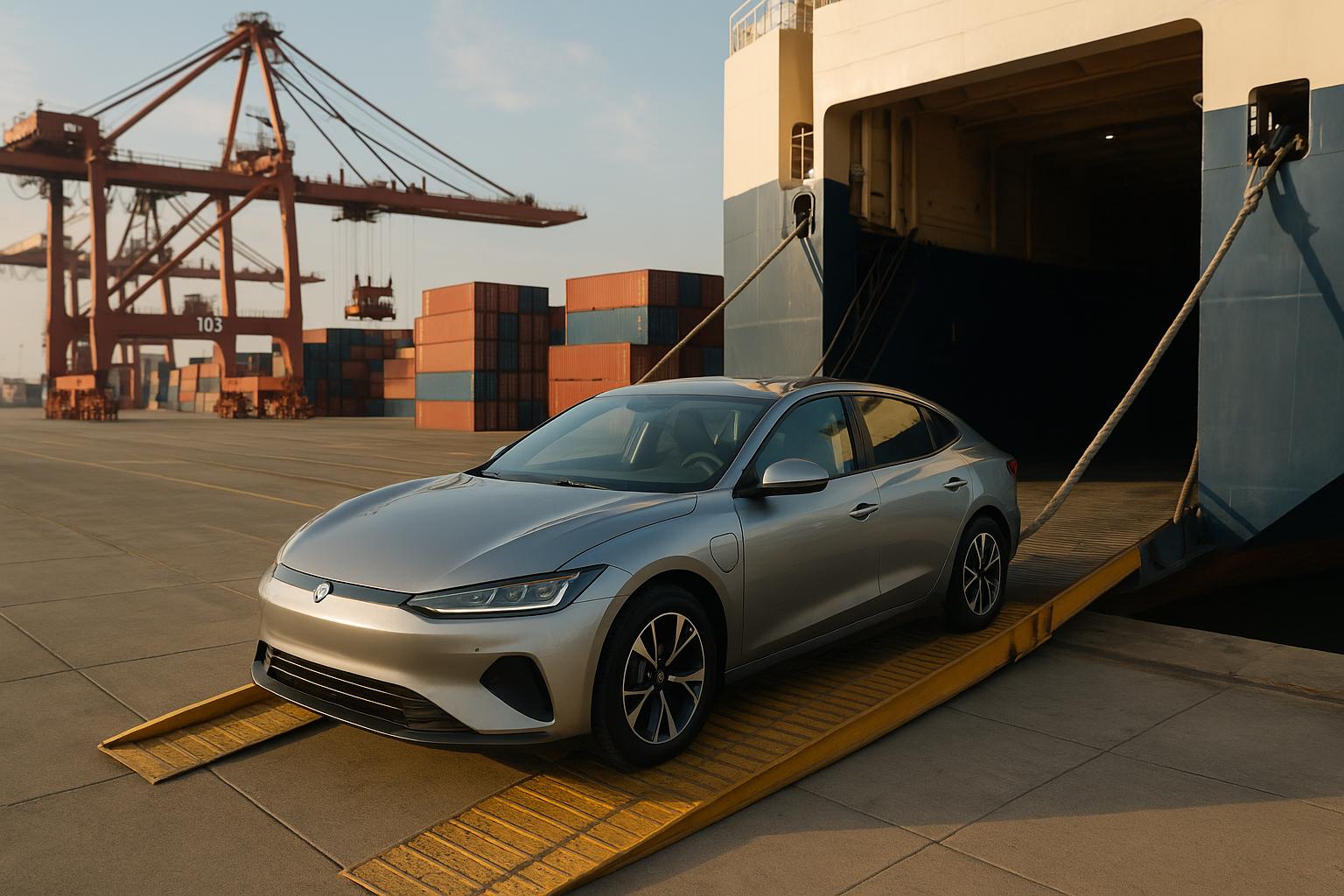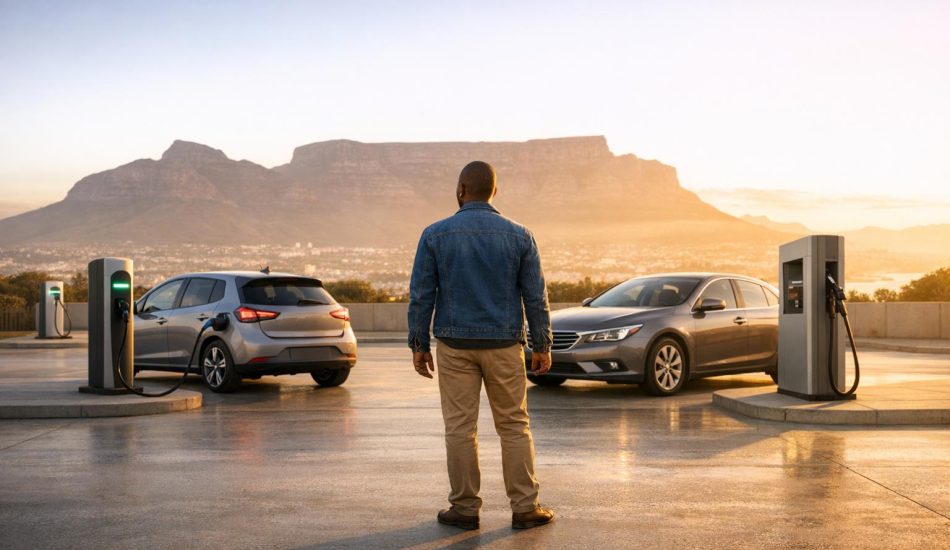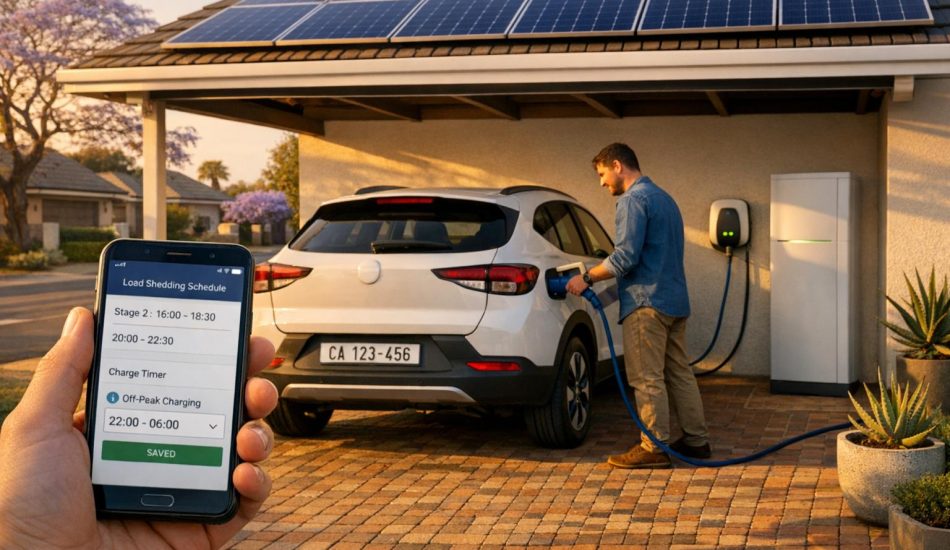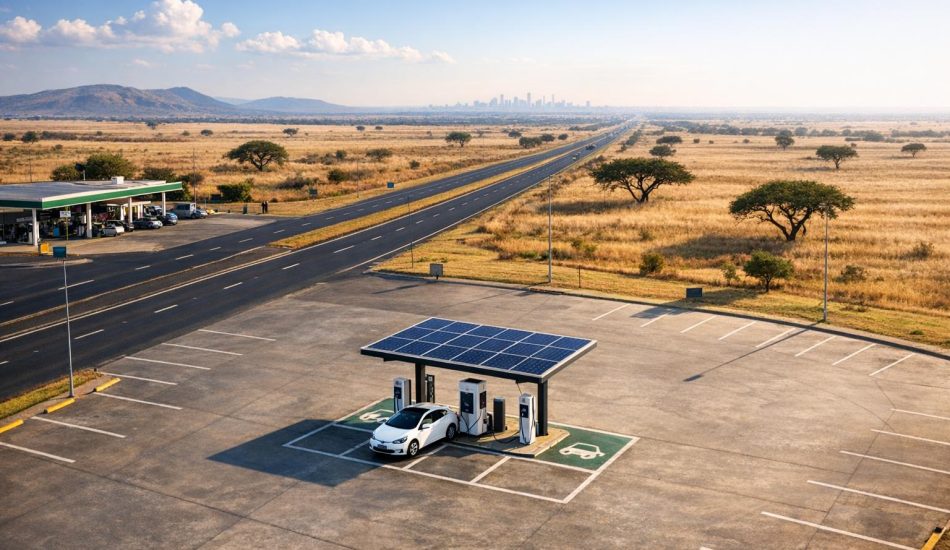
Importing electric vehicles (EVs) from China to Nigeria in 2025 is simpler and more cost-effective than ever. With reduced taxes, growing EV demand, and streamlined processes, this guide breaks down everything you need to know. Here’s a quick overview:
- Tax Benefits: EVs are exempt from VAT, Import Adjustment Tax, and other levies, making them cheaper to import than gasoline cars.
- Trusted Suppliers: Leading Chinese manufacturers like BYD, Geely, and Dongfeng offer quality EVs at competitive prices.
- Shipping Costs: Container shipping ranges from $1,200–$2,500, while RoRo is a cheaper alternative ($800–$1,500).
- Customs Clearance: Key documents include a bill of lading, commercial invoice, and certificate of origin. Licensed clearing agents can simplify the process.
- Registration: After customs, register your EV, secure insurance, and obtain a roadworthiness certificate to make it legally roadworthy.
The Real Reason Cars Are So Expensive in Nigeria (What Dealers Don’t Say) | The RWM Podcast EP 07
Nigeria’s Electric Vehicle Import Rules and Requirements
Nigeria has introduced a simplified regulatory framework to encourage electric vehicle (EV) imports. With a focus on reducing carbon emissions and promoting cleaner transportation options, the government has implemented policies that make importing EVs more attractive. Let’s take a closer look at the rules and tax breaks that are shaping this shift.
Government Policies and Tax Breaks for EV Imports
Nigeria’s tax system makes importing electric vehicles much more affordable by waiving several taxes and levies that apply to traditional gasoline-powered cars. These include VAT, the Import Adjustment Tax, the National Automotive Council (NAC) Levy, and the ECOWAS Trade Levy.
- VAT Exemption: Unlike conventional cars that are subject to a 7.5% Value Added Tax, EVs are entirely exempt. This significantly improves their price competitiveness in the market.
- Import Adjustment Tax (IAT): While traditional vehicles incur this tax, it’s completely waived for EVs.
- NAC Levy and ECOWAS Trade Levy: Both of these additional costs, which apply to regular vehicles, are also removed for electric vehicles.
Here’s a quick comparison of tax components for traditional cars versus EVs:
| Tax/Duty Component | Traditional Cars | Electric Vehicles |
|---|---|---|
| Import Duty | 35% | Substantially Lower |
| Value Added Tax (VAT) | 7.5% | Exempt |
| Import Adjustment Tax (IAT) | Applied | Exempt |
| National Automotive Council Levy | Applied | Exempt |
| ECOWAS Trade Levy | 0.5% | Exempt |
These exemptions make EV imports significantly cheaper, providing a financial edge over traditional vehicles. However, it’s important to note that these benefits are only available for newer electric vehicles that meet specific age restrictions.
Finding Trusted Electric Vehicle Suppliers in China
China’s electric vehicle (EV) manufacturing industry is vast, but not all suppliers deliver the same level of quality or reliability. To ensure a successful partnership, it’s important to focus on manufacturers with proven track records, especially those with experience in international markets. Once you’ve tapped into the regulatory advantages of sourcing from China, the next step is securing a dependable supply chain.
How to Check Supplier Reliability
Finding a trustworthy supplier involves a few key steps:
- Verify essential certifications and licenses. Look for suppliers with valid business licenses, ISO certifications, and export permits. Reliable companies are also responsive, providing detailed information and demonstrating a solid understanding of global business practices.
- Request critical documentation. Reliable suppliers should provide certificates of origin, quality control records, and export compliance documents. These ensure that their vehicles meet required safety and environmental standards for export.
- Inspect production facilities. Whether through an in-person visit or a virtual tour, assess their production capabilities, quality control measures, and professionalism. Many reputable manufacturers offer these options to showcase their operations.
- Check export history and references. Established suppliers often have relationships with international importers and can provide references. Confirm their after-sales support, including spare parts availability, warranties, and technical assistance networks.
Major Chinese EV Manufacturers to Consider
Once you’ve established a set of reliability criteria, focus on manufacturers with a strong reputation for quality and export success.
- BYD (Build Your Dreams): One of the leaders in China’s EV market, BYD offers a wide range of vehicles, from passenger cars to commercial models. Known for its advanced battery technology and competitive pricing, BYD has built a solid international presence.
- Geely Auto Group: Renowned for its partnerships with global brands like Volvo, Geely produces electric vehicles under multiple brand names. Their strict quality standards make them a strong contender for export markets.
- SAIC Motor Corporation: Operating brands like MG and Maxus, SAIC has a robust lineup of EVs. Their extensive international experience and established warranty and service networks make them a reliable choice for importers.
- Great Wall Motors: Specializing in SUVs and pickup trucks, including electric models under the ORA and WEY brands, Great Wall Motors is gaining traction in export markets with vehicles tailored to international needs.
- Chery Automobile: With years of export experience, Chery has earned a reputation for reliability. Their EV lineup includes both passenger and commercial vehicles, offering competitive pricing and solid quality.
- NIO, XPeng, and Li Auto: These newer players focus on premium electric vehicles with cutting-edge technology and sleek designs. They are gradually carving out a niche in export markets.
When evaluating manufacturers, pay close attention to vehicle specifications, spare parts availability, warranty terms, and local service support. Many importers start with smaller orders to test reliability before scaling up. Building strong relationships with a few trusted suppliers can lead to more effective partnerships in the long run.
Total Cost Breakdown for Electric Vehicle Imports
Understanding the full financial picture is crucial when importing an electric vehicle (EV). The total cost involves various fees, taxes, and charges that can significantly affect your budget. Breaking these down ensures you’re prepared and helps you avoid any unwelcome surprises during the process.
All Import Costs Explained
The vehicle purchase price is where it all begins, typically ranging from $15,000 to $45,000 for most Chinese EVs, depending on the model and its features. However, this is just the tip of the iceberg in terms of overall expenses.
Shipping costs vary based on the method you choose – container or roll-on/roll-off (RoRo). Container shipping from major Chinese ports like Shanghai or Shenzhen to Lagos costs between $1,200 and $2,500 per vehicle. While this option provides better protection, RoRo shipping is more affordable, ranging from $800 to $1,500 per vehicle, though it offers less security during transit.
Marine insurance is essential to cover risks during transit. This typically costs 0.5% to 1.5% of the vehicle’s declared value. For example, on a $25,000 EV, insurance premiums would fall between $125 and $375.
Customs duties form a significant part of the total cost. Nigeria imposes a 35% duty rate on imported vehicles, calculated using the Nigeria Customs Service‘s VIN valuation system rather than the actual purchase price. This valuation can sometimes differ, impacting the final duty amount either positively or negatively.
Port handling charges include terminal handling fees ($150 to $300), storage fees (around $25 per day after the free storage period), and examination fees ($50 to $100). Efficient clearance is crucial to minimize extra costs.
Clearing agent fees range from $500 to $1,200, depending on the complexity of the shipment and the agent’s expertise. These professionals manage documentation, customs procedures, and coordination with port authorities, making their services particularly helpful for first-time importers.
Documentation costs include expenses like bills of lading ($50 to $150), certificates of origin ($30 to $80), and other administrative fees, which together can total $200 to $500 per shipment.
Transportation from the port to your final destination adds another $200 to $800, depending on how far the vehicle needs to travel and the method of transport.
These costs collectively highlight the financial commitment involved in importing an EV. But how do these expenses stack up against traditional gasoline vehicles?
Cost Comparison: EVs vs Gas Cars
Nigeria’s import policies create some clear cost advantages for EVs over gasoline-powered cars. Chief among these is the Value Added Tax (VAT) exemption for EVs under the National Automotive Industry Development Plan.
| Cost Component | Electric Vehicle | Gasoline Vehicle | Difference |
|---|---|---|---|
| Import Duty Rate | 35% | 35% | No difference |
| VAT Rate | 0% (Exempt) | 7.5% | $1,875 savings on $25,000 EV |
| Excise Duty | Not applicable | 20% on luxury cars | Up to $5,000 savings |
| Annual Vehicle License | Standard rate | Standard rate | No difference |
The VAT exemption alone saves $1,875 on a $25,000 EV. Add to that the absence of excise duties, which can add up to 20% for luxury gasoline vehicles, and the financial benefits of importing an EV become even clearer. These savings often offset the higher upfront cost of EVs, making them a competitive option.
For example, importing a mid-range Chinese EV priced at $25,000 typically totals $38,000 to $42,000 after all fees. In contrast, a gasoline vehicle with the same purchase price would cost $40,000 to $45,000 to import, largely due to VAT and potential excise duties.
Long-term cost savings further tip the scales in favor of EVs. Lower maintenance needs, reduced fuel expenses, and the possibility of future incentives for EV adoption in Nigeria add to their financial appeal, extending benefits well beyond the initial import process.
Financing options also differ. Some Nigerian banks offer favorable loan terms for EV purchases, aligning with the government’s push for sustainable transportation. These financing deals can make owning an EV even more affordable.
As Nigeria continues to refine its EV policies, discussions about additional incentives suggest that the financial advantages of importing EVs could grow. This makes now an especially attractive time to consider making the switch.
sbb-itb-99e19e3
Shipping Your Electric Vehicle from China to Nigeria
Once you’ve worked out the costs, the next step is ensuring your electric vehicle (EV) gets shipped safely and efficiently. This process involves careful planning, proper documentation, and an understanding of logistics, so your investment arrives in Lagos without any hiccups.
Container Options and Shipping Methods
When it comes to shipping EVs, container shipping is one of the safest options. A 20-ft container is ideal for a single vehicle, offering protection from weather, potential handling damage, and safeguarding delicate components like charging ports.
If you’re shipping more than one vehicle or need extra space for spare parts, a 40-ft container might be a better fit. It can accommodate two smaller EVs or one larger vehicle with additional equipment, often reducing the per-vehicle shipping cost when fully packed.
For larger EVs or those with rooftop accessories like solar panels, high cube containers are a great choice. They provide extra vertical space, making them handy for vehicles that might not fit into standard containers.
Another option is Roll-on/Roll-off (RoRo) shipping, where your vehicle is driven directly onto the ship and secured on a dedicated deck. While this method is usually more affordable than container shipping, the vehicle is exposed to weather during transit. RoRo is suitable for newer EVs that can handle moderate exposure, but it’s not recommended for high-end or modified models.
If you’re shipping just one vehicle, consolidation services can help lower costs. These services allow you to share a container with other shipments, and many freight forwarders in major Chinese ports offer this as an alternative to booking a full container.
Choosing the right shipping method depends on your EV’s value and how much risk you’re willing to take. Keep in mind that some methods, like container shipping, may require extra time for loading and unloading, so plan your schedule accordingly.
Getting Your Vehicle Ready for Shipping
Proper preparation is key to smooth shipping. Start by thoroughly cleaning your EV, as Chinese port authorities require vehicles to be free of dirt or residues that might carry contaminants. Ports like Shanghai and Shenzhen offer cleaning services that also issue clearance certificates needed for customs.
Set the battery to a low charge level for safe transportation and remove any aftermarket charging cables or adapters that could complicate documentation or cause delays.
Make sure you have all the required documents, including the commercial invoice, certificate of origin, and export permits. Additionally, purchasing marine cargo insurance is a smart move. This insurance covers theft, damage, or loss during transit and is usually based on the declared value of the vehicle. Some policies even cover delays that could lead to extra storage fees at the destination port.
Before shipping, conduct a pre-shipment inspection. Document your EV’s condition with photos and include details like battery charge level and odometer reading. Remove any loose items and secure all accessories. For container shipments, professional teams will typically use wheel chocks and tie-down straps to keep your vehicle stable during transit.
Tracking Your Shipment and Managing Delivery Times
Once your EV is on its way, tracking its progress is crucial. Shipping times from major Chinese ports to Lagos usually take a few weeks, depending on the shipping line and route. Direct routes from ports like Shanghai tend to be faster, while those with intermediary stops can take longer.
Most major shipping lines offer real-time tracking, so you can monitor updates on your shipment’s location, departure, and estimated arrival using your bill of lading tracking number. Some freight forwarders also provide consolidated tracking services for added convenience.
Be aware that weather conditions and seasonal factors can impact delivery schedules. While shipping companies typically include buffer time in their plans, severe weather or port congestion – especially during peak seasons – can cause delays. Staying in regular contact with your freight forwarder and clearing agent is essential to get timely updates and address any unexpected changes.
Start coordinating delivery well before your vehicle’s arrival. Double-check that all paperwork is in order and work with your clearing agent to handle any required customs inspections. Proper planning at this stage can help you avoid unnecessary costs, like storage fees that kick in after the free storage period at the destination port ends.
Customs Clearance and Port Procedures in Nigeria
The customs clearance process for electric vehicles in Nigeria typically starts at Lagos Port. Delays during this phase can lead to additional storage fees, so it’s crucial to understand the requirements and work with experienced professionals to navigate this process efficiently.
Before engaging a clearing agent, ensure you have all the necessary documents ready.
Documents Needed for Customs Clearance
The Nigeria Customs Service requires several key documents for vehicle clearance. Missing even one can result in major delays.
- Bill of Lading: Issued by your shipping company, this document proves shipment and ownership. It includes details like the vehicle’s origin, destination, and shipping terms. Ensure all information matches across your paperwork.
- Commercial Invoice: This document from your Chinese supplier should include the purchase price, vehicle specifications, and payment terms. Customs relies on this to calculate duties, so the declared value must accurately reflect the transaction. Understating values can lead to penalties and delays.
- Certificate of Origin: Provided by Chinese authorities, this confirms where the vehicle was manufactured. It helps determine tariff rates and trade agreement benefits.
- Proforma Invoice: This outlines detailed vehicle specifications, such as battery capacity, motor power, and safety features. Clearly labeling the vehicle as "electric" ensures proper classification under Nigeria’s EV import policies.
- Form M (Import Duty Report): This electronic document, completed via the Nigeria Trade Portal before the vehicle’s arrival, initiates the import process and generates a transaction reference number.
- Additional Documents: Include a packing list, marine insurance certificate, and bank receipts to verify compliance with foreign exchange regulations.
Once your documents are in order, the next step is to work with a professional clearing agent.
Working with Clearing Agents
A licensed clearing agent is essential for navigating the complex customs procedures at Lagos Port. These professionals can expedite document verification, duty calculations, and physical inspections. Their established relationships with customs officials often help streamline the process.
Clearing agents handle numerous tasks, including verifying duty classifications, coordinating with port authorities, and arranging vehicle delivery. For electric vehicles, they also address specific requirements like battery safety documentation and environmental compliance certificates.
When selecting a clearing agent, prioritize those with experience in vehicle imports, particularly electric vehicles. Their expertise can help avoid errors and ensure smoother processing. Fees for clearing agents depend on your vehicle’s value and the complexity of the import process.
To maximize efficiency, establish clear communication with your clearing agent before the vehicle arrives. Provide all necessary documents in advance and confirm their familiarity with electric vehicle import requirements. Agents who specialize in automotive imports often have connections with vehicle inspection services, which can further simplify the process.
Common Problems and Solutions
While importing electric vehicles, several challenges may arise. Here’s how to address them:
- Document Discrepancies: If details on your bill of lading differ from your commercial invoice, customs may require additional verification. Double-check all documents for accuracy and consistency before shipping.
- Incorrect Duty Calculations: Electric vehicles may be misclassified under higher tariff rates meant for conventional cars. Have your clearing agent verify the classification and challenge any errors to avoid overcharges.
- Inspection Delays: Customs officials may face delays in accessing your vehicle for examination, especially with container shipments. Anticipate potential delays and adjust pickup schedules accordingly.
- Storage Fees: After the free storage period, daily fees apply. Work with your clearing agent to expedite the clearance process and avoid unnecessary costs.
- Battery Safety Documentation: Nigerian authorities require safety compliance for EV batteries. Ensure your Chinese supplier provides all necessary certifications and documentation.
- Foreign Exchange Compliance: The Central Bank of Nigeria mandates proof of legitimate foreign exchange transactions for imports above certain thresholds. Keep proper banking documentation and work with authorized dealers to meet these requirements.
Vehicle Registration and Legal Requirements
After your electric vehicle (EV) clears customs and is officially in your possession, the next big step is registration. This process is what turns your imported EV into a legally roadworthy vehicle in Nigeria. The steps are quite similar to those for registering a conventional car, although there are a few specifics to keep in mind for EVs.
How to Register Your Imported EV
In Nigeria, vehicle registration is handled either by the Federal Road Safety Corps (FRSC) or your state’s vehicle licensing authority. To get started, you’ll need to have the following documents ready: Customs Clearance Certificate, proof of insurance, and valid identification.
Registration fees can vary depending on the state, typically ranging between ₦50,000 and ₦100,000. For example, if your EV was cleared at Apapa Port in Lagos, you’d complete the registration through the Lagos State Vehicle Licensing Authority. Once you pay the required fees, you’ll receive your license plate and roadworthiness certificate.
Getting Roadworthiness Certification and Insurance
With registration out of the way, the next step is ensuring your EV meets all legal and safety standards. This includes obtaining mandatory insurance, which is required before registration, and securing a roadworthiness certificate. The roadworthiness certificate verifies that your EV complies with the necessary safety and quality standards for operation on Nigerian roads.
An important document in this process is the Certificate of Conformity (COC). This certificate, which usually costs around $800, confirms that your vehicle meets international safety and quality standards. Many Chinese manufacturers include a COC with vehicles destined for export. However, if this wasn’t arranged beforehand, acquiring the certificate later could add several weeks to your timeline.
During the roadworthiness inspection, officials will carefully compare your vehicle’s specifications against the documents you provided during customs clearance. If there are any mismatches, it might lead to delays or additional verification steps.
Once you’ve completed registration, obtained insurance, and passed all inspections, your EV is officially roadworthy and ready to hit the road in Nigeria.
Summary: Your Complete Guide to Importing Electric Vehicles in 2025
Bringing an electric vehicle (EV) from China to Nigeria requires careful planning, but following the right steps can help you save money and make the process smoother. Start by exploring Nigeria’s incentives for EVs compared to gas-powered cars. Then, research trusted Chinese suppliers like BYD, Geely, and Dongfeng to ensure they meet global quality standards.
Once you’ve chosen a reliable supplier, prepare for all upfront expenses. These include the vehicle’s cost, shipping fees, customs duties, and certifications. Proper documentation is crucial to ensure hassle-free shipping and quick customs clearance. After your vehicle clears customs, you’ll need to register it, secure insurance, and obtain a roadworthiness certificate.
Electric vehicles come with several benefits, such as lower running costs, reduced maintenance, and contributing to Nigeria’s transition to cleaner transportation. The process is made even easier with the help of online tools.
Platforms like EV24.africa simplify the entire import process. They offer a marketplace with verified EV listings from trusted Chinese manufacturers, complete with detailed information, transparent pricing, and services like financing and delivery. Visit EV24.africa to explore tools that support every step of your EV import journey.
FAQs
Are there any manufacturing year requirements for electric vehicles to qualify for tax exemptions in Nigeria?
In Nigeria, electric vehicles must be manufactured in 2015 or later to qualify for tax exemptions. Aside from this manufacturing year requirement, there are no further age-related conditions.
How can I make sure the Chinese supplier I choose for electric vehicles is trustworthy and meets global quality standards?
To make sure your Chinese EV supplier is trustworthy and adheres to international quality standards, start by verifying that they comply with China’s required certifications, such as the CCC certification. This certification guarantees the safety and quality of EV components. Additionally, confirm whether their vehicles align with globally recognized standards for performance and safety, as many Chinese manufacturers are now producing EVs that compete on the international stage.
It’s also a good idea to request third-party testing or certification reports to confirm compliance with export regulations and quality standards. Establishing trust through transparent communication, examining customer reviews, and thoroughly researching their track record can help you avoid potential pitfalls and ensure a seamless import experience.
What should I do if there are errors in my import documents during customs clearance in Nigeria?
If you spot mistakes or inconsistencies in your import documents during customs clearance in Nigeria, it’s crucial to address them quickly. Reach out to the Nigerian Customs Service to clarify the issue and submit any required corrections or additional supporting paperwork.
To minimize delays or avoid penalties, it’s a good idea to work with a customs broker or logistics professional familiar with Nigeria’s import rules. Their knowledge can guide you through the process smoothly and help ensure everything meets the necessary standards.




